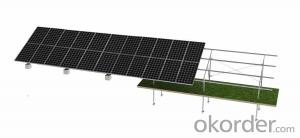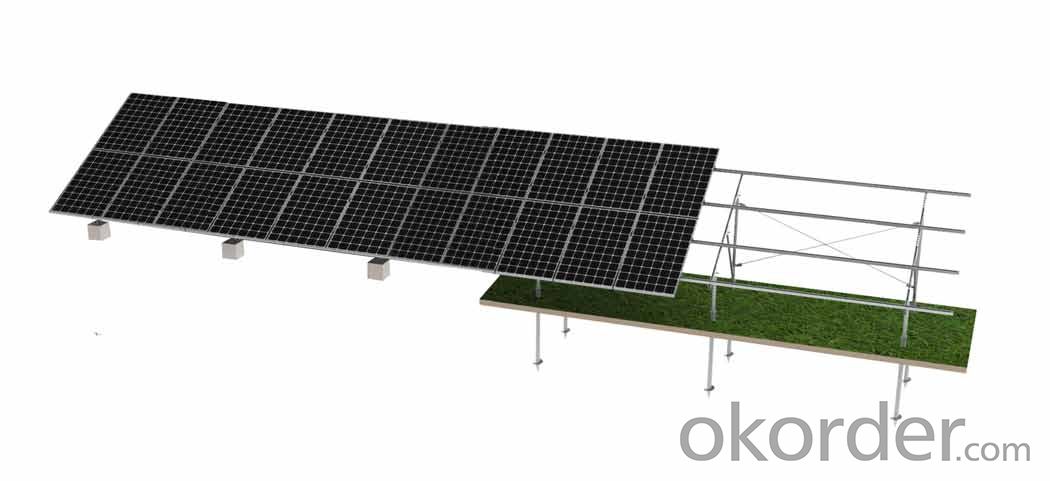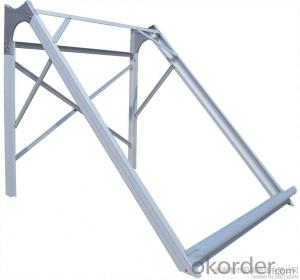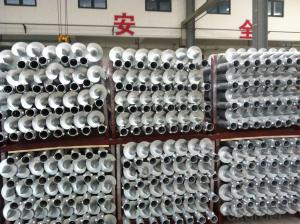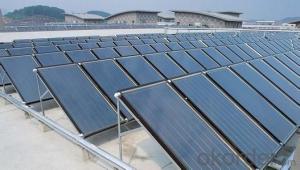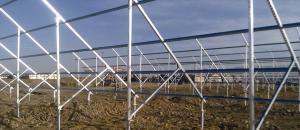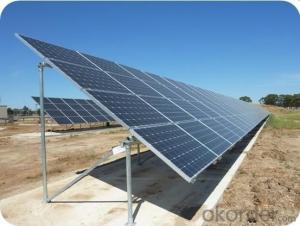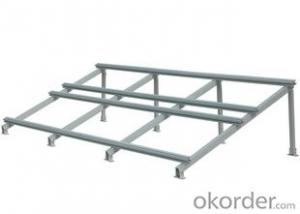Solar Heat Energy Double Screw Pile Ground System
- Loading Port:
- China Main Port
- Payment Terms:
- TT OR LC
- Min Order Qty:
- -
- Supply Capability:
- -
OKorder Service Pledge
OKorder Financial Service
You Might Also Like
Packaging & Delivery
Packaging Detail:Normal package seaworthy
Delivery Detail:15 days
Specifications
Easy installation Competitive price TUV&SGS test report & CSA certification 15-warranty
Specifications
1) Super smooth beautiful appearance,outstanding quality,large supply.
2) Available in customized surface finishes.
3) Well machined,for example,cutting,drilling and milling with excellent tolerance.
4) Meet with customer’s designs and supply you best price.
5)Usages:Supply for solar panel modules.
Technical characteristics
Installation site:
ground,hillside,and grassland
Installation angle
it is based on customers’ requirements
Installation height
it is basedon customers’ requirements
Solar panel type; with or without frame
Components arrangement :horizontal or vertical
Support track
aluminum alloy extrusion
Quality warranty
15 years
Advantages
1)Quick installation: with high degree of pre-installed rate, the system could be easily installed by using galvanized carbon steel rails for PV Stent, and specially designed connection parts of the PV bracket, which could reduce installation time and cost greatly.
2)Offer unmatched durability: with all structural components comprised of high class stainless steel and anodized aluminum alloy, it is designed for 25 years service life and backed by 15 years warranty.
3)Stand up to extreme weather: The SuninTek solar mount is designed to stand up to the extreme weather complied with the AS/NZ 1170 and other international structure load standard by the skilled engineer. The main support components also have been tested to guarantee its structure and load-carrying capacity.
4)Provide broad installation flexibility: These systems accommodate most commercially available framed solar panels , and they can scale easily from small to large, multi-megawatt installations.
5)Diversified Application: The PV mounting system produced can be adopted by various types of PV cells panels which you can find in the market. It can serve for both mini solar power system and huge plant with megawatt capability.
Main features
1. Installation cost savings.
2. Save installation time.
3. Increase the mechanical strength of solar energy mounting to ensure that wind requirements.
4. The outdoor for installation of solar energy.
5. Length can be customized according to customers.
6. Service life of up to 25 years.
7. Products through the international certification.
8. Stent material composition of the galvanized steel and aluminum.
9. 15 years system and structural guarantee.
10.Flexible post spacing withstands different wind & snow loads.
11. High quality material in Aluminium 6005-T5 and SUS 304.
12.Screws and nuts go with every components needed.
13.Mechanical calculation and reliability tested to ensure highest product quality.
- Q: Are there any limitations to the lifespan of solar energy systems?
- Solar energy systems do have limitations to their lifespan, with the degradation of solar panels being the most significant. Over time, the photovoltaic cells in the panels gradually degrade, resulting in a decrease in efficiency. On average, solar panels experience an annual degradation rate of about 0.5-1%. This means that after 25-30 years, the panels may only produce around 75-80% of their original power output. Another limitation arises from the lifespan of other components in the solar energy system, including inverters, batteries (if applicable), and wiring. Inverters, responsible for converting the DC electricity generated by the solar panels into AC electricity for household or business use, typically last for 10-15 years. Batteries, if used for energy storage, have a limited lifespan of approximately 5-10 years. Wiring can also deteriorate over time due to exposure to the elements, necessitating maintenance or replacement. Moreover, the lifespan of solar energy systems can be impacted by environmental factors. Extreme weather conditions like hailstorms, hurricanes, or heavy snowfall can cause damage to solar panels, reducing their efficiency or rendering them inoperable. Additionally, excessive heat can accelerate the degradation of solar panels, leading to a shorter lifespan. Nevertheless, it is essential to highlight that proper maintenance and regular inspections can help maximize the lifespan and performance of solar energy systems. Many solar panels come with warranties that ensure their performance for a specific number of years, often ranging from 20 to 25 years. Furthermore, ongoing technological advancements and improvements in manufacturing processes may result in longer-lasting and more efficient solar energy systems in the future.
- Q: Are there any disadvantages of solar energy systems?
- Yes, there are a few disadvantages of solar energy systems. Firstly, the initial installation cost can be high, making it less accessible for some individuals or communities. Secondly, solar panels require a large surface area to produce a significant amount of energy, which might be challenging in urban or limited space environments. Additionally, solar energy generation is dependent on sunlight, so it may not be as reliable during cloudy days or at night without the use of storage systems. Finally, the production and disposal of solar panels can have environmental impacts, particularly if not handled properly. However, despite these drawbacks, the benefits of solar energy, such as its renewable nature and reduced environmental impact, outweigh the disadvantages, making it a viable and increasingly popular energy option.
- Q: How do solar energy systems affect water usage?
- Solar energy systems have a minimal impact on water usage compared to other forms of electricity generation. Unlike conventional power plants that rely heavily on water for cooling and steam generation, solar energy systems do not require water for their operation. This makes solar energy an environmentally friendly and sustainable alternative that conserves water resources.
- Q: Can solar energy systems be used for heating swimming pools?
- Yes, solar energy systems can be used for heating swimming pools. Solar pool heaters use sunlight to heat the water in the pool, reducing the reliance on traditional energy sources. This is an environmentally friendly and cost-effective way to maintain a comfortable temperature in swimming pools.
- Q: How do solar energy systems impact waste reduction?
- Solar energy systems can greatly impact waste reduction by reducing the reliance on fossil fuels for electricity generation. As solar power harnesses energy from the sun, it eliminates the need for burning fossil fuels, which reduces the production of harmful greenhouse gases and air pollutants. Moreover, solar energy systems have a long lifespan and require minimal maintenance, resulting in reduced waste associated with traditional energy sources like coal or natural gas. Overall, solar energy systems play a significant role in minimizing waste and promoting a cleaner and more sustainable future.
- Q: Can solar energy systems be used for powering remote monitoring equipment?
- Yes, solar energy systems can be effectively used for powering remote monitoring equipment. Solar panels can capture sunlight and convert it into electricity, which can then be stored in batteries for consistent power supply to remote monitoring equipment. This allows for reliable and sustainable operation of such equipment even in remote locations where grid connection may not be available. Solar energy systems offer a cost-effective and environmentally friendly solution for powering remote monitoring equipment.
- Q: Can solar energy systems be used in areas with frequent cloud cover?
- Yes, solar energy systems can still be used in areas with frequent cloud cover. While cloud cover can affect the efficiency of solar panels, advancements in technology have allowed solar systems to generate electricity even in cloudy conditions. Additionally, battery storage systems can be implemented to store excess energy for use during periods of low sunlight.
- Q: What is the impact of shading on the performance of solar panels?
- Shading can significantly impact the performance of solar panels, as it reduces the amount of sunlight reaching the panels and subsequently decreases their energy production. Even partial shading of just a small area of a panel can lead to a significant drop in overall output. This is because solar panels are typically interconnected in series, meaning the current flowing through one shaded panel can affect the entire string, limiting the performance of the entire system. To mitigate the impact of shading, strategies like panel repositioning, tilt adjustments, or the use of bypass diodes can be employed to minimize losses and optimize energy generation.
- Q: Can solar energy systems be used in areas with high pollution?
- Yes, solar energy systems can still be used in areas with high pollution. While pollution may reduce the efficiency of solar panels to some extent, they can still generate electricity even in polluted environments. Furthermore, using solar energy can help reduce the dependency on fossil fuels and contribute to reducing pollution over time.
- Q: Can a solar energy system be installed in areas with high humidity?
- Yes, a solar energy system can be installed in areas with high humidity. High humidity may impact the performance of the solar panels to some extent, but modern solar panels are designed to withstand various weather conditions, including high humidity. Proper installation and regular maintenance can ensure the efficiency and durability of the system in such areas.
Send your message to us
Solar Heat Energy Double Screw Pile Ground System
- Loading Port:
- China Main Port
- Payment Terms:
- TT OR LC
- Min Order Qty:
- -
- Supply Capability:
- -
OKorder Service Pledge
OKorder Financial Service
Similar products
Hot products
Hot Searches
Related keywords
